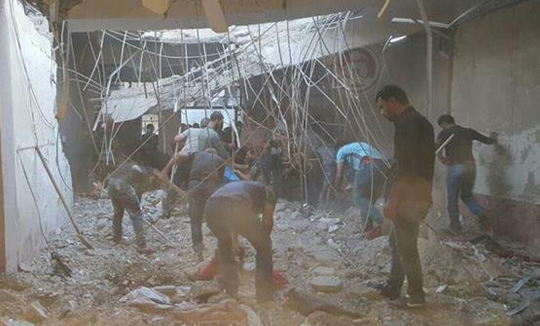Bagdad, Oct 22: At least 15 women have lost their lives and scores of other civilians have sustained injuries when fighter jets operated by the so-called US-led coalition struck a mourning procession in Iraq’s oil-rich northern province of Kirkuk.

Local official Amir Huda Karam said the aerial attack targeted a Shia place of worship in the town of Daquq, located approximately 180 kilometers north of the capital Bagdad, on Friday.
‘Not justifiable’
Meanwhile, Iranian Foreign Ministry spokesman Bahram Qassemi condemned the killing of Iraqi civilians by foreign military forces under the pretext of fighting terrorism, saying that no excuse can justify attacking innocent civilians attending a mourning procession.
He also offered the Islamic Republic’s condolences to the Iraqi government and nation over the deadly attack in Daquq.
US-led strike on the heels of Daesh attack
The tragic incident came just hours after three Daesh Takfiri terrorists attacked a power plant in the town of Dibs, located 55 kilometers northwest of Kirkuk, and blew themselves up, killing 18 people, including three Iranians.
Security sources, speaking on condition of anonymity, said the slain Iranian technicians were carrying out maintenance at the facility.
The sources added that some of the surviving militants had blocked off the road between the town and the power station.
Crude oil production facilities were not affected as a result of the assault, and power supply remained uninterrupted.
The security sources said the situation in Kirkuk had largely been brought under control after Kurdish forces dislodged the militants from all the police and public buildings they had seized before dawn.
Earlier, multiple explosions ripped through Kirkuk and bursts of machine gun fire could be heard across the northeastern oil city.
Witnesses, requesting anonymity, said much of the fighting was focused on a government compound in the city.
Kirkuk Governor Najmadin Karim, however, stated that militants had not managed to take control of any government buildings in the city, located 236 kilometers north of Bagdad.
A curfew is now in effect and streets are largely deserted amid fears of militant snipers.
Local authorities had earlier said some of the assailants were holed up in a hotel and a mosque in the middle of Kirkuk.
Lieutenant General Talib Shaghati, commander of Iraq's Joint Operations Command, said the attackers in Kirkuk came from outside the city.
The Takfiri Daesh terrorist group later claimed responsibility for the attacks in Dibs in an online statement.
The assaults came four days after nearly 30,000 army soldiers, fighters from pro-government Popular Mobilization Units and Kurdish Peshmerga forces launched a massive and multi-pronged operation to retake the city of Mosul from Daesh militants.
Iraqi journalist killed in Kirkuk
Additionally, a senior correspondent for the regional and state-run Turkmeneli television network has been fatally shot by a Daesh sniper in Kirkuk.
An unnamed police colonel said 30-year-old Ahmet Haceroglo was struck by a sniper bullet to the chest and died of his wounds as he was covering incidents in Kirkuk.





Comments
Add new comment